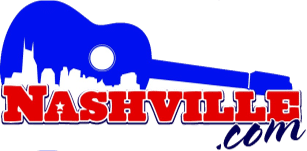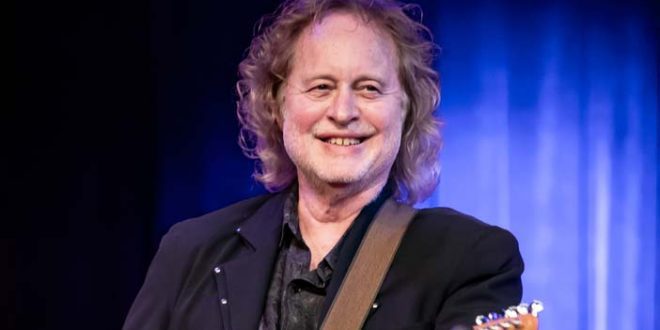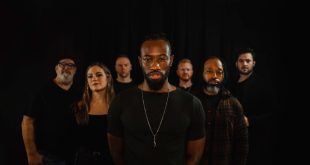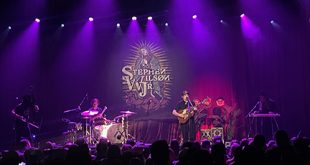Steve Ripley, leader of the country-rock band The Tractors, died peacefully at his home Thursday, January 3 in Pawnee, OK at the age of 69, surrounded by his family. He had been suffering from cancer.
In addition to his work as a recording artist, Ripley was also a songwriter, producer, engineer, studio owner, radio host and inventor of the “stereo guitar” favored by such fellow musicians as Eddie Van Halen, Ry Cooder and Dweezil Zappa.
Owner of The Church Studio in Tulsa for 19 years, Ripley additionally distinguished himself by playing guitar with Bob Dylan and producing and/or engineering projects for Leon Russell, J. J, Cale, Roy Clark, Johnnie Lee Wills, and many others.
Born Paul Steven Ripley on January 1, 1950 during his parents’ brief residency in Idaho, Ripley grew up on the family’s Oklahoma Land Run homestead in Pawnee County. On his radio show, he recalled his earliest musical memory came when he was only three years old while listening to his dad enthusiastically singing along to Bob Wills’ “Roly Poly” in the family car. He said his “most impactful” musical memory was hearing Elvis Presley’s “Heartbreak Hotel” blasting from his Aunt Babe’s radio when he was six. “It just slayed me,” he marveled. “Nothing would ever be the same.” Seeing the Beatles on the Ed Sullivan Show was yet another “cosmic moment.”
Ripley played in bands from junior high through college and continued to work nearly full-time as a musician while attending Oklahoma State University, where he earned a degree in communications. He discovered his love for recording in the 1960s, recording in Gene Sullivan’s Hi Fi Studio in Oklahoma City, the same venue where Tulsans J.J. Cale, Leon Russell, and David Gates made some of their first recordings. He opened his first studio, Stillwater Sound, in the early 1970s.
Ripley was a friend and confidante of many luminaries of rock, country, and Americana music, and was respected throughout the industry for his gifts as an artist and producer, and for his technical innovations in the world of guitars, microphones and sonic design. Once, while sitting at George Harrison’s recording console at Friar Park, Ringo Starr asked Steve, “Do you know how to run this thing?” To which Steve replied, “Well yeah, I guess I do. You know, it’s what I do.”
His lifelong interest in modern musicology was highlighted by his radio series, Oklahoma Rock & Roll, which explored Oklahoma’s vast contributions to music and American pop culture; and most recently, his successful efforts to rescue and preserve the musical archives of his friend and mentor, Leon Russell.
The first LP in his discography was named for his band, Moses. The name the band chose for their record label, Red Dirt Records, places Ripley at the birth of the Oklahoma strand of music that would one day be called Americana. Given his role in the origin story and his legendary support for regional musicians in the genre through the years, Ripley has long been regarded as one of the patriarchs of “Red Dirt” music, and is an inductee into the Oklahoma Red Dirt Hall of Fame.
In April of 1976, Ripley married Charlene Grant, whom he met at his Stillwater recording studio when her school band was recording there. She became his constant companion from that time onward.
After a stint writing songs in Nashville, Ripley landed a job as a live sound engineer for music legend Leon Russell. He then moved back to Oklahoma in the late 1970s, to work for the Jim Halsey Company and produce critically acclaimed records for the likes of Roy Clark/Gatemouth Brown and Johnnie Lee Wills. From there, he moved to Burbank, CA to work as a studio engineer for Leon Russell’s Paradise Records, aiding Russell on many projects including those by JJ Cale and New Grass Revival. He also played on two J.J. Cale records. It was during this period that the Ripleys’ children, Elvis and Angelene, were born. This was also a period when Ripley had the once-in-a-lifetime opportunity to play for one of his biggest musical heroes, Bob Dylan. Ripley’s “Dylan connection” was his friend, legendary drummer for the stars (and Tulsa native) Jim Keltner, who was also playing with Dylan at the time. Ripley said of Keltner: “He got me the Dylan gigs, introduced me to The Beatles…I’m a lucky farm boy to have such a friend.” Ripley played guitar on the Dylan album Shot Of Love and jetting off on a world tour, playing in Dylan’s band as well. In a 2009 interview for Rolling Stone, Dylan recalled Ripley as one of his favorite guitar bandmates.
Says Keltner: “Steve had so many different talents. Ry Cooder had him customize some very unique gear that eventually became a very cool part of his sound. Steve came aboard Bob Dylan’s great gospel band in 1981, and did the last two tours with us. He and the great Fred Tackett, along with my buddy Tim Drummond, playing Bob’s music behind him, was something I’ll never forget!”
Another friendship that emerged from Ripley’s time in California was with legendary guitarist Eddie Van Halen, with whom he collaborated on his stereo guitar design and started the company Ripley Guitars. The two forged what became a lifelong friendship and mutual love that lasted until Ripley’s final days.
“For more than 35 years I’ve been fortunate to call Steve Ripley one of my true friends,” says Van Halen. “Steve is many things. Part genius, part musician, part inventor and many other great things, but my favorite thing about Steve is the wonderful, kind, humble human being he is and always will be. I love Steve with all my heart and am proud to know him.”
In 1987, the Ripley family moved back to Tulsa, and he acquired The Church Studio, the legendary recording venue which Leon Russell owned in the 1970s. This would become his second home and the hub for his larger body of creative work—including seven albums for The Tractors and a solo album, Ripley. The latter was a departure from the “Oklahoma Boogie” stylings and leaned more toward roots Americana. Ripley is among Oklahoma artists who have caried the torch of the music originated by the likes of Leon Russell and J.J. Cale — music that later came to be called “the Tulsa Sound.”
Beyond his own personal body of work, Ripley contributed to a number of Church Studio collaborations with such artists as Red Dirt Rangers, Hanson, Chainsaw Kittens, Admiral Twin, and Carlton Pearson, among others. He was a mentor to many young musicians and fans, and he was known as an anchor to the neighboring community, particularly supporting his homeless friends in the area. “Knowing and working with Steve was a pleasure,” says Isaac Hanson of Hanson. “Whether we were recording, mixing or simply sharing our love for great music, Steve was a wealth of knowledge and a source of encouragement. Steve will always be to me, to all of us, a beloved friend, and an immense musical talent gone too soon.”
In 1994, The Tractors managed to take the country music world by storm with their first self- titled album. For Ripley, the project was the culmination of a quest to blend his earliest influences—from the western swing of Bob Wills and traditional country stylings of Hank Williams to the emergence of Chuck Berry and what Ripley called “the Elvis thing.” Record company expectations for this unique hybrid were low, but The Tractors’ debut album shocked the contemporary country world by going platinum faster than any debut album by a country group in history, and eventually achieving double-platinum status.
Tim DuBois, president of The Tractors’ label at that time, said of his first impression, “I remember dropping a tape into the machine and the first thing I heard was ‘The Tulsa Shuffle,’ and being hooked immediately.” The album garnered two Grammy nominations, won CMT Video of the Year for its smash single, “Baby Likes to Rock It” and is to this day the top-selling record of all time for a work recorded in Oklahoma. Vince Gill called The Tractors “one of the coolest bands ever.”
“Steve was truly a creative genius,” says DuBois. “He and I had known each other since the late sixties when we both attended Oklahoma State. Our musical careers took us down different paths, but when they crossed again in the early nineties, I was running Arista Nashville, and he and a group of his Tulsa friends were building The Tractors. The music wasn’t exactly country, but it was exactly great. Somehow we managed to get it on country radio, the CMA Awards show, and sell over two million albums.
Finding himself ready for the simpler life, Ripley sold both the studio and his Tulsa home in 2005, and he and Charlene moved back out to the Pawnee County farm where he was raised, quickly expanding it beyond the small farmhouse to a compound with a guitar shop, recording studio, a second house for hosting innumerable parties and friends, and, yes, even a chicken coop. This became the new Ripley headquarters, a studio simply dubbed “The Farm,” from which he hosted his Oklahoma Rock & Roll radio show for the Oklahoma Historical Society. He continued recording music, including a collaboration with the Red Dirt Rangers titled Ripley and The Rangers, and a full length LP for The Red Dirt Rangers as well.
In 2013, Ripley was hired as an audio archivist, and worked with OKPOP Executive Director Jeff Moore to engineer a collection of unreleased Bob Wills recordings which was later released on vinyl. Most notably and recently, in 2016, OKPOP acquired the Leon Russell archive and Ripley became the official Curator of the Leon Russell collection, working as a diligent steward for the legacy of his dear friend and mentor. Ripley worked restoring, cataloguing, digitizing, and archiving invaluable Leon Russell master tapes for the museum, forthcoming in downtown Tulsa. His love for this project and Leon kept him going during his final days. “Steve was such an inspiration to all of us at the OHS, his vision and dedication to the OKPOP project has been invaluable,” says Moore. “He truly loved Oklahoma, he introduced us to so many of his friends and colleagues in the music industry, we will always be indebted to him. His passion and energy will continue to live through everything we do in OKPOP.”
In 2017, Ripley was given the opportunity to re-visit two of the great passions of his life—his role as a band leader and his love of all things Bob Dylan, when he was asked by the George Kaiser Family Foundation to create a live musical event celebrating the arrival of the Bob Dylan archives, which were acquired and relocated to Tulsa and are soon to be housed in the Bob Dylan Center. “On A Night Like This” was a one-night-only musical revue and saw Ripley leading what he dubbed “The House Band Approximately.” It featured a bevy of too-many-to-name legends of Oklahoma music, many of the new generation of Oklahoma voices and talent, and even the powerhouse vocal stylings of the McCrary Sisters, featuring Regina McCrary, a tourmate of Ripley’s from the Bob Dylan days. The concert, which would be his final live performance, was a tour-de-force of a wide range of the Bob Dylan catalog.
Along with creating a substantial body of recordings for his own album projects in progress, Ripley continued to work as producer and collaborator on various projects in the Americana genre and to focus on the primary love of his life, his wife and family. His final recording is an epic composition written and recorded for his grandson Mickey, titled “Mickey and Grandpa (A Day In the Life).” In it, he blends a gently spoken-word narrative with an unmistakably Ripley guitar presence, a beautifully sung chorus and a musical bridge borrowed from one of his earliest musical heroes, The Beatles.
Steve Ripley leaves with us the words with which he closed all of his radio shows: “Don’t forget, family is what’s important. Tell your mama you love her. Kiss your babies. We’re all in this together. Bye-bye, kids.”
Steve is survived by his wife Charlene, his children, son Elvis Ripley and girlfriend Paige Turlington , daughter Angelene Ripley Wright, son-in-law Jonny Wright, grandson Mickey Wilder Ripley Wright, and brothers Scott Ripley and Bobby Ripley and their families.
The family will announce a memorial service later. In lieu of flowers, the family requests donations to The Red Dirt Relief Fund, which provides a safety net of critical assistance to Red Dirt music people in times of need. http://www.reddirtrelieffund.org
For more information about Steve Ripley and his musical legacy: http://www.thetractors.com/






